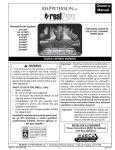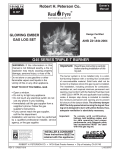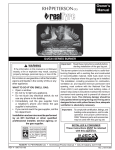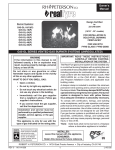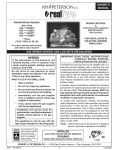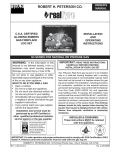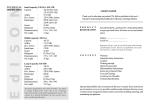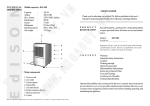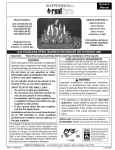Download R.H. Peterson G45 Series Owner`s manual
Transcript
Owner’s Manual Burner Systems: Design Certified G45-16/19(P) G45-18/20(P) G45-24(P) G45-30(P) G45-36(P) G45-42(P) G45-48(P) G45-60(P) to: Z21.84b-2004 (16/19" - 30" models) FOR INSTALLATION IN SOLID-FUEL BURNING FIREPLACES* G45 SERIES VENTED GAS LOG SETS (UNREGULATED) WARNING If the information in this manual is not followed exactly, a fire or explosion may result, causing property damage, personal injury, or loss of life. Do not store or use gasoline or other flammable vapors and liquids in the vicinity of this or any other appliance. WHAT TO DO IF YOU SMELL GAS: • Open a window. • Do not try to light any appliance. • Do not touch any electrical switch; do not use any phone in the building. • Immediately call the gas supplier from a neighbor’s phone. Follow gas supplier’s instructions. • If you cannot reach the gas supplier, call the fire department. Installation and service must be performed by a qualified professional installer, service agency, or the gas supplier. This appliance is only for use with the type of gas indicated on the rating plate. IMPORTANT: READ THESE INSTRUCTIONS CAREFULLY BEFORE STARTING INSTALLATION OF THE LOG SET The Real-Fyre gas log set is to be installed only in a solid-fuel burning fireplace with a working flue and constructed of noncombustible material.The installation, including provisions for combustion and ventilation air must conform with the National Fuel Gas Code, ANSI Z223.1/NFPA 54, or the CSA B149.1, Natural Gas and Propane Installation Code, and applicable local building codes. A damper clamp is included to maintain the minimum permanent vent opening and to prevent full closure of the damper blade. The chimney damper MUST be fully opened when burning the log set.The log set is designed to burn with yellow flames; thus adequate ventilation is absolutely necessary. To comply with certification, listings, and building code acceptances, and for safe operation and proper performance of this log set, use ONLY Peterson parts and accessories. Use of other controls, parts, and accessories that are not designed for use with Real-Fyre gas log sets is prohibited and will void all warranties, certifications, listings, and building code approvals, and may cause property damage, personal injury, or loss of life. *Note: Solid-fuels shall not be burned in a fireplace where a decorative appliance is installed. INSTALLER: Leave this manual with the appliance. CONSUMER: Retain this manual for future reference. ROBERT H. PETERSON CO. • 14724 East Proctor Avenue • City of Industry, CA 91746 REV 5 - 1011041445 1 L-A2-207 TABLE OF CONTENTS PARTS LIST IMPORTANT INFORMATION FIREPLACE REQUIREMENTS INSTALLATION INSTALLING THE BURNER GRANULE, EMBER, AND GRATE PLACEMENT LOG PLACEMENT OPTIONAL CHARRED SERIES INSTALLATION LIGHTING INSTRUCTIONS MAINTENANCE & SERVICE OPTIONAL CONTROLS OPTIONAL PETERSON VALVES & SAFETY PILOT KITS* TROUBLESHOOTING YOUR GAS LOG SET WARRANTY Tools Recommended Available Log Styles: The following tools and supplies may be needed to assemble, install, and test the Real-Fyre® gas log set: 1. 2. 3. 4. 5. 6. Adjustable open-ended wrench 8" - 10" Pipe wrench 8" - 10" Pliers Teflon tape or pipe compound resistant to propane gas Small Phillips-head screwdriver & flat-head screwdriver Leak detector or soapy water solution & brush to test for gas leaks 7. Work gloves (for hot logs only) Charred Series Designer Series Charred Oak (CHD) Charred Split (CHS) Charred Royal (CHB) Golden Oak Designer Plus (RDP) Split Oak (S) Split Oak Designer Plus (SDP) Woodland Oak (WO) Emberwood Designer (EXD) Royal English Oak Designer (BD) Heritage Designer (HD) White Birch (W) Golden Oak Designer (RD6) Classic Series Golden Oak (R) Post Oak (PO) Emberwood (E) Royal English Oak (B) Mountain Oak (K) Twisted Pine (C) Other tools used for plumbing or gas appliance installation may be necessary. FOR YOUR SAFETY Do not store or use gasoline or other flammable vapors and liquids in the vicinity of this or any other appliance. REV 5 - 1011041445 3 4 4 5 5 6 6 8 9 10 10 11 12 14 WARNING Improper installation, adjustment, alteration, service, or maintenance can cause injury or property damage. Refer to this manual. For assistance or additional information, consult a qualified installer, service agency, or the gas supplier. 2 L-A2-207 PARTS LIST Before installation, check that your gas burner system is complete. See the parts list below. If any parts are missing or damaged, contact your Real-Fyre® dealer. Various log styles are available for the G45 Triple-T burner system (see previous page) and are sold separately. Be sure you know the model and size of your set when ordering logs, options, or replacement parts and accessories. 5 1 6 8 Connector kit 8A 4 7 2 8B 3 ITEM No. 1. 2. 3. 4. 5. 6. or 7. 8. DESCRIPTION Grate Burner pan Fuel injector / air mixer Stabilizer clips (with screws and nuts) Glowing embers Select sand granules (natural gas only) Vermiculite granules (propane gas only) Damper clamp with bolt Connector kit (with adapters) QTY 1 1 1 2 1 1 1 1 1 Note: All drawings & photos in this manual are not to scale. 8C Replacement parts can be ordered from your local Real-Fyre® dealer. Note: The log set is purchased and packaged separately. Actual parts may differ REV 5 - 1011041445 3 L-A2-207 IMPORTANT INFORMATION Important: To comply with certification, listings, and building code acceptances, and for safe operation and proper performance of this log set, use ONLY Peterson Real-Fyre® parts and accessories. Use of other controls, parts, and accessories that are not designed for use with Real-Fyre® gas log sets is prohibited and will void all warranties, certifications, listings, and building code approvals, and may cause property damage, personal injury, or loss of life. Check to be sure the fireplace meets venting and construction requirements for the installation of the Real-Fyre® gas log set (see FIREPLACE REQUIREMENTS section, below). Be sure your gas log set is properly sized for your fireplace. Improper sizing may negatively impact the proper drafting of the fireplace. Additionally, too large a log set will adversely affect the burn and hamper the proper operation of the control system. Too small a log set will diminish the beauty of your hearth setting. Fig. 4-1 below shows the critical dimensions of your firebox. The table below shows log set dimensions. FIREPLACE REQUIREMENTS This Real-Fyre® gas log set is to be installed only in a fully vented, noncombustible fireplace with an open damper. The chimney must be free of any obstructions. The fireplace must be designed and approved to burn wood. Your Real-Fyre® log set is designed to burn with yellow, smoky flames. For this reason, it must be adequately vented. The fireplace must have a gas-supply line that has been installed by a qualified technician in accordance with all local codes. The gas-supply line must be ½" minimum interior diameter. If the gas line to the fireplace is longer than 20', a larger-diameter line may be necessary. A fireplace screen must be in place when the system is burning. Provisions for adequate combustion air must be maintained. Unless other provisions for combustion air are provided, the screen shall have an opening(s) for introduction of combustion air. Combustion air is adequate when all flames curl into the fireplace and away from the screen. When a glass fireplace enclosure (door) is used, leave the doors fully open when the system is in operation. Required Gas Pressure: The minimum inlet gassupply pressure for the purpose of input adjustment is 7" of water column (w.c.) for natural gas and 11" w.c. for propane. The maximum inlet gas-supply pressure is 10.5" w.c. for natural gas and 13" for propane. Fig. 4-1 Fireplace Dimensions Rear width Height Depth Front width opening Note: It is recommended that complete firebox dimensions (front width, back wall, and height) be obtained to ensure proper sizing. Min. Fireplace Dimensions Burner size Width BTU Depth Height Front* Rear NAT. L.P. 16/19" 25" 23" 11" 18" 40k 35k 18/20" 26" 24" 14" 18" 75k 50k 24" 30" 28" 14" 18" 90k 65k 30" 36" 34" 15" 18" 90k 65k [36"] 42" 40" 16" 18" 120k 90k [42"] 48" 46" 20 ½" 18" 130k 110k [48"] 54" 52" 20 ½" 18" 145k 115k [60"] 66" 64" 20 ½" 18" 150k 120k * This required width allows for centering of the log set. Add 4" to front width if the burner is to be installed with a pilot kit. Note: Rear width is at corresponding depth. Bracketed sizes indicate non-certified burner systems. Minimum Free Opening Area of Chimney Damper for Venting (sq. in.) For Factory-Built Fireplaces * Chimney Height 15' (min.) 20' 30' 16/19" 18/20" 24" 30" 36" 42" 48" 60" 25 23 21 47 43 38 57 51 46 57 51 46 75 68 61 82 73 66 91 82 73 94 85 76 * For Masonry-Built Fireplaces; add 4 sq. in. to amount shown. REV 5 - 1011041445 4 L-A2-207 INSTALLATION The damper clamp with hex bolt (Fig. 5-1) is provided as a means to prevent full closure of the damper blade. The clamp is easily attached to most damper blades with pliers or a wrench, and must be permanently installed. The clamp is designed to prevent accidental closure of the damper when installed as illustrated (Fig. 5-2 and Fig. 5-3). Should the clamp not fit, or fail to provide the permanent vent opening listed in the table found above, have a permanent stop installed, remove the damper blade, or have the damper cut to provide the minimum permanent Set screw opening required. Note: These are minimum damper opening specifications. The damper must be completely opened when operating this gas appliance to achieve the best ventilation possible. Damper clamp Fig. 5-1 Open Closed Fig. 5-2 Fig. 5-3 INSTALLING THE BURNER The Real-Fyre gas log set must be installed by a qualified professional service technician. Instructions must be followed carefully to ensure proper performance and full benefit from the gas log set. Check to be sure the log set is designed and labeled for the type of gas (natural or propane gas) supplied to the fireplace. Fireplace floor must be level, clean, and smooth. WARNING: Failure to position the parts in accordance with these diagrams or failure to use only parts specifically approved with this appliance may result in property damage or personal injury. REFER TO THE PARTS LIST WHEN FOLLOWING THESE INSTRUCTIONS. If your burner is to be installed with a pilot kit; carefully follow the instructions supplied with your pilot kit for specific gas connection. The burner pan is supplied with an air mixer for propane gas or a fuel injector for natural gas. The air mixer / fuel injector must be used in ALL installations. The air mixer / fuel injector has a precisely sized orifice to ensure only the proper quantity of gas enters the burner. This allows maximum performance and gas conservation. 1. MAKE SURE THE FIREPLACE GAS SUPPLY IS TURNED OFF. 2. Locate the gas-supply stub inside the fireplace and remove the cap, if attached (see Fig. 5-4). CAUTION: When removing the cap, make sure the stub does not turn, loosening the connection inside the wall. 3. Attach the small adapter (Item 8C) to the fuel injector / air mixer on the burner pan, using a pipe compound resistant to all gases. Tighten securely. DO NOT REMOVE THE FUEL INJECTOR / AIR MIXER. Then attach one end of the flex connector (Item 8B) to the small adapter. Tighten securely. 4. Place the burner system into the fireplace so the open burner pan faces outward. 5. Locate the grate (Item 1) and attach the stabilizer clips (Item 4) to the 2 outer bars of the grate with screws and nuts. The stabilizer clips should be positioned towards the middle of the bars (Fig. 5-5). Place a clip on each side of the bar, insert the screw, attach the nut, and loosely tighten. Repeat for the other side. 6. Place the grate over the burner pan so the stabilizer clips fit over the back edge of the burner pan to lock it in position. Completely tighten the clips in place. Fig. 5-4 Fig. 5-5 Stabilizer clips on grate GRATE STABILIZER CLIPS BACK WALL OF FIREPLACE Gas line cap Gas supply line stub REV 5 - 1011041445 BURNER PAN 5 L-A2-207 INSTALLATION (cont.) 7. Center this assembly in the fireplace and place it as far back in the fireplace as possible. Remove the grate for the gas connection and granule/ember placement. Fig. 6-1 - Fireplace valve 8. Be sure gas to the fireplace is off. Attach the large adapter (Item 8A) to the gas-supply stub using a pipe compound resistant to all gases. Tighten securely. Then attach the open end of the flex connector to the large adapter. Tighten securely. Ensure the pan rests level on the fireplace floor after connection. Adjust the pan if necessary. Flex connector Fuel injector / air mixer Burner Pan Large Adapter Small 9. LEAK TEST: Use a long-necked butane lighter, or lay Adapter Gas a lighted match next to the burner pipe, and carefully supply stub turn on the gas supply until the burner ignites. Test at all connections for leaks using the appropriate soapy water solution. If bubbles appear, a leak is present. Turn off the gas and tighten at all connections. Repeat until no leaks are present. If a leak persists, turn off the gas supply and contact the local gas company or dealer. NEVER USE A FLAME TO CHECK FOR LEAKS. Turn off the gas supply prior to proceeding. GRANULE, EMBER, AND GRATE PLACEMENT GRANULE PLACEMENT The granules supplied with the unit are specially selected for use with either propane gas or natural gas. They maximize flame distribution and reduce carbon buildup. 1. Fill the burner pan completely with the granules* (Item 13). See Fig. 6-2. Avoid spilling the granules on the pilot kit (if equipped). *Note: Use only select sand for natural gas burners and vermiculite for propane gas burners. 2. Slope the granules at the same angle as the burner pan. This is important to ensure quiet lighting and even flame distribution. Back wall of fireplace Place granules in pan & slope to angle of pan Burner pan Fig. 6-2 Granule placement EMBER PLACEMENT Sprinkle the glowing embers (Item 14) lightly and evenly over the entire surface of the granules. Break up any clumps that may have developed during shipment. (For Charred series log sets, refer to OPTIONAL CHARRED SERIES INSTALLATION section.) Important: Do not add any additional embers to this log set. Any additional embers may cause unsafe operation. GRATE PLACEMENT Replace the grate so that the stabilizer clips fit over the back edge of the pan, locking it in position. LOG PLACEMENT CAUTION: Burn hazard. Logs will remain hot for some time after use. You must maintain the log layout as shown to ensure proper operation of your log set. If you need to reposition any log to maintain the proper layout, use heat-resistant gloves or allow logs adequate time to cool before handling. Styles and sizes will vary depending upon the log set ordered. If the log set ordered includes placement instructions; follow those instructions. REV 5 - 1011041445 6 L-A2-207 LOG PLACEMENT (cont.) NOTE: LOGS SUPPLIED SEPARATELY. Log placement is very important for the proper operation of the Real-Fyre® gas log set. Although you have some flexibility in the log arrangement, it is necessary to follow the LOG PLACEMENT instructions carefully to fully enjoy your log set. Follow the steps below, referring Rear bottom to Fig. 7-1 through Fig. 7-5. Front Stabilizer log bottom Back wall clips 1. The second-longest log, the rear log, is placed on log Grate of fireplace the rear of the grate with the bark of the log facing forward (Fig. 7-1). Center the log left to right (Fig. 7-5, #1). If the log has a heat chamber (a recess in Stabilizer clip Glowing embers the back), it can face either forward or to the rear. fits over rear (on top of granules) edge of burner pan 2. The longest log, the front log, is placed on the front Granules of the grate with the bark facing forward. Center Burner pan left to right (Fig. 7-2, #2). If the log has a heat chamber, it should face to the rear. NOTE: Be sure Fig. 7-1 to maintain a space between the front and rear logs (Fig. 7-1). This creates energy efficiency, heat radiation, and reduces carbon buildup. 3. Top logs should be stacked diagonally, with the largest at the bottom (Fig. 7-3, #3 & 4), and with spaces between the logs so that the flames are not choked off. Place the smaller logs diagonally across the larger ones (see Fig. 7-4, #5 & #6). The top logs may be moved to achieve desired flame pattern. Some carbon buildup (sooting) may occur where the flames impinge on the logs and should not be a concern unless excessive. If sooting is excessive, rearrange the top logs to reduce flame impingement. Examples of log stacks are shown below. Note: Although log styles may differ in pattern or shape ( Fig. 7-6), layout is essentially the same. Adequate spacing between the logs is NECESSARY and MUST be maintained for best performance. STEP 1. Place the second-longest log to the rear. Fig. 7-2 1 2 Fig. 7-5 Alternative examples of log layout (Split Oak set shown). Note the space between the logs. STEP 2. Place the longest log at the front. STEP 3. Place the largest top logs across the bottom logs. STEP 3 (cont.) Place the smaller top logs across the other logs. Fig. 7-4 Fig. 7-3 4 6 3 5 Knotholes go to the front or back as desired. (Note the gaps between the logs.) Note: 24" Golden Oak (R-24) shown Royal English Oak Designer Split Oak Designer Plus Woodland Oak Fig. 7-6 - Recommended log patterns REV 5 - 1011041445 7 L-A2-207 OPTIONAL CHARRED SERIES INSTALLATION GLOWING EMBERS PLACEMENT Note: Optional Charred Series log sets are supplied with an ember screen (Fig. 8-1). Fig. 8-1 Attach the ember screen to the burner by slipping it onto the back edge (center left to right) with the perforated section facing toward the back fireplace wall (Fig. 8-1). Cover the surface of the ember screen with the Glowing Embers (Fig. 8-2). For best glowing performance, they should be applied evenly and pulled slightly apart so the fibers are somewhat loose. (It is not necessary to pile the entire bag of the Glowing Embers. More Glowing Embers may be added after completion of the entire installation). Ember screen (supplied with optional Charred Series log sets) Fig. 8-2 LOG PLACEMENT Log styles and sizes will vary depending upon the Charred Series log set ordered. CHARRED SPLIT (CHS) layout shown. Place the long bottom rear log (Log #2) on the back The charred sections should be over the opening of the grate with the flat featureless side facing the between the front and rear logs (Fig. 8-4). rear of the fireplace. The two sections of the front Place the small top charred logs (Logs #5 & 6) so log (Logs #1A & 1B) are placed on the front of the they rest over the charred sections of the front bottom grate with the charred sections facing each other and log sections (Logs # 1A & 1B) and on the two curved approximately 1 inch apart at the top (Fig. 8-3). logs (Logs #3 & 4) (Fig. 8-5). Slide the logs to the front of the grate. Finally, place the curved top charred log (Log #7) to Note: Be sure to maintain a space between rest on the two top logs at rear, but not encroaching the front and rear logs (Fig. 8-3). This into the space between rear and front logs (Fig. creates energy efficiency and heat radiation, 8-6). and reduces carbon buidup. Note: The additional top log (Log #7) is not available Place the two curved logs (Logs #3 & 4) so that one with 18" log sets. end rests on each front log section (Logs #1A & 1B) and the other end rests on the rear log (Log #2). Fig. 8-3 Fig. 8-4 LOG #2 LO #4 G G #3 LO LOG #1A LOG #1B MAINTAIN A SPACE IN THE CENTER OF THE LOGS AT ALL TIMES Fig. 8-5 Fig. 8-6 Log #7 G LO G REV 5 - 1011041445 #5 #6 LO 8 L-A2-207 LIGHTING INSTRUCTIONS Before operating your gas log set: 1. Be sure your fireplace is free from flammable liquids or combustible materials. 2. Be sure your damper is open. 3. Smell all around the gas log set for the odor of escaping gas. IF YOU SMELL GAS, FOLLOW THE INSTRUCTIONS ON P. 1. If your gas log set is operated by the fireplace valve: 1. Lay a lighted long-stem match on the surface of the embers near the gas inlet (do not hold the match in your hand) or use a lighted long-necked butane lighter (Fig. 9-1). 2. Slowly turn the fireplace remote valve to the ON position. Your log set should light. 3. If the log set does not light before the match goes out, immediately turn the valve to the OFF position. 4. Wait approximately five (5) minutes to clear out any gas, and repeat steps 1-3 above. 5. If your log set fails to light again, turn the valve to the OFF position and contact your dealer or gas supplier. 6. To extinguish your gas log set, turn the valve to the OFF position. Be sure the valve is turned fully off to avoid any gas leakage. Fig. 9-1 Apply match - then turn on gas If your burner is operated by a pilot kit: 1. Carefully follow the lighting instructions supplied with your pilot kit for the steps to ignite the burner. REV 5 - 1011041445 9 L-A2-207 MAINTENANCE & SERVICE Maintenance Once installed and operating properly, your Real-Fyre® gas log set will require regular maintenance. You should inspect your log set and controls (where installed) for the following: 1. Excessive sooting - Some sooting of your log set is normal, adding to the appearance of burned wood. If excessive sooting accumulates, clean the logs using any of the following options: Option 1. Spray the logs with clean water when they are being burned and hot. The soot will lift off and burn off. Option 2. Brush the soot off with a stiff brush when the logs are cold. Do not use water or soot cleaners at the same time as brushing the soot off. 2. Moisture may cause the granules and Glowing Embers in your burner pan to settle. To improve the burn, follow these tips. a. Settling of sand (or vermiculite) - Using a screwdriver or flat-blade knife, carefully stir the granules, loosening the material. Clear up any spills. b. Embers - Break up any clumps that may have formed, then redistribute the embers on the granules. 3. Debris around the control (where used) - Inspect control and pilot to be sure it is free of dirt or debris. Service While some minor service conditions may be handled by the owner of the log set, it is recommended that a qualified professional service technician be called to maintain and service the gas log set and any installed control system. The TROUBLESHOOTING section of these instructions serves as a guide for ensuring optimum performance of your gas log set. OPTIONAL CONTROLS THIS UNIT COMES WITHOUT A VALVE INSTALLED. IT MAY BE CONNECTED DIRECTLY TO AND OPERATED BY YOUR FIREPLACE VALVE. Alternatively, your Real-Fyre® gas log set may be operated using a number of optional Peterson control systems (see below). Peterson control systems are engineered to provide convenient, safe, and reliable operation of your gas log set. For safe operation, proper performance, and to comply with safety standards and certifications, use only Robert H. Peterson Company control systems, parts, and accessories with your Real-Fyre® log set. If you have purchased a valve separately, unpack your Peterson control system and check the PARTS LIST provided with your control to be sure all parts are included. Peterson Control Systems Manual On/Off Systems AV-17 (knob) or AV-18 (rod handle) ................ Manual Safety Pilot Systems SPK-20 (knob) or SPK-21 (rod handle) .......... SPK-26 ........................................................... Manual On/Off, match lit, no pilot Standard Pilot Low-Profile Valve Remote Systems (APK-11, EPK-01) Available Accessories Toggle Switch, WS-1 Wall switch, WS-2 Wall timer, WCS-1 Wood Chip switch, RR-1A Remote, RR-2A, Deluxe Remote, PC-105 Pine Cone Remote. Variable Remote System (APK-150, APK-15, APK-17) Available Accessories WS-3 Wall switch, VR-1A Variable Flame-Height Remote, VR-2A Deluxe Variable Flame-Height Remote. REV 5 - 1011041445 10 L-A2-207 OPTIONAL PETERSON VALVES & SAFETY PILOT KITS* Note: For all valves and safety pilot kits shown on this page, carefully follow the instructions supplied with your safety pilot kit for steps to assemble and install it on the burner pan and test for leaks. *Available from your local Real-Fyre® dealer APK-11 SPK-20 Fuel injector Main burner pipe Burner pan Fuel injector Main burner pipe Hearth adapter Connector Burner pan Gassupply line Connector APK-11 remoteready Adapter valve Front burner Fireplace floor Fireplace floor Note: Heat shield is not shown, but must be in place when operating your glass burner. APK-11 Valve SPK valve Front burner Gassupply line Hearth adapter Note: Heat shield is not shown, but must be in place when operating your glass burner. SPK-20 Fig. 11-4 Fig. 11-1 APK-15 SPK-26 Fuel injector Burner pan Main burner pipe Connector Fuel injector Connector Burner pan Main burner pipe Adapter Front burner Fireplace floor APK-15 Valve Fig. APK-17 Gassupply line Hearth adapter APK-15 remote safety valve SPK-26 Hearth safety adapter valve Fireplace floor Note: Heat shield is not shown, but must be in place when operating your glass burner. 11-2 INJECTOR Fuel FUEL injector BURNER Burner PAN pan Adapter Front burner SPK-26 Valve Fig. 11-5 AV-17 AV-18 Connector CONNECTOR TUBE Fuel injector Main burner pipe Adapter GAS SUPPLY LINE Gas-supply line ELBOW Note: Heat shield is not shown, but must be in place when operating your glass burner. Burner pan Flared adapter Connector Gassupply line FRONT FLAME BOOSTER SPKvalve VALVE APK Front burner Fireplace floor APK-17(M)(P) valve APK valve ON/OFF valve Fireplace floor Hearth adapter Fig. 11-7 Note: Heat shield is not shown, but must be in place when operating your glass burner. Fig. 11-3 REV 5 - 1011041445 11 L-A2-207 TROUBLESHOOTING YOUR GAS LOG SET SYMPTOM 1. Excessive smoking and sooting 2. Low flame REV 5 - 1011041445 CAUSE SOLUTION A. Poor draft or downdraft A. Check for chimney blockage. Be sure chimney is at least 3' taller than anything within 10' of it in all directions. If not, consult a chimney sweep. Chimney cap or fan may help. Under severe conditions, you may need to open a window near the fireplace about 1" to 2" when burning the log set. B. Improper burner for gas used B. Use only a natural-gas set with natural gas. Use only a propane-gas set with propane gas. C. Damper closed C. Open the damper fully when operating the gas log set. D. Improper log placement D. Be sure the bottom logs are spaced at least 3" apart. Top logs should be placed to minimize flame impingement. E. Air mixer on propane set is closed E. Open the air mixer completely. A. Incorrect log set for type of gas used A. Consult your dealer for proper set. B. Insufficient gas supply B. Other gas appliances may be competing for gas supply. Consult installer or plumber. Orifice size is based upon 7" w.c. pressure for natural gas and 11" w.c. pressure for propane gas. Plumbing must supply adequate pressure. C. Blockage or kink in connector kit, plumbing, or burner orifice C. Clean out blockage. If connector kit is kinked, replace it. D. Valve not fully open D. Open valve fully. 12 L-A2-207 TROUBLESHOOTING YOUR GAS LOG SET (Continued) SYMPTOM 3. Uneven flame distribution. (Lower at one end of the burner) 4. Flame at air mixer (For propane units) REV 5 - 1011041445 CAUSE SOLUTION A. Clogged or blocked portholes A. Portholes can be cleared of foreign object by running a wire through them. B. Insufficient gas pressure and/or supply B. Consult installer or plumber. (See solution 2b.) C. Granules may be packed down too tightly C. Loosen granules around burner pipe by running a kitchen knife along both sides or pipe. Even out granules in burner pan. D. Auxiliary shutoff valve partially closed D. Open valve fully. Usually, you will find this along the wall 3' from the fireplace. A. Clogged or blocked portholes A. Portholes can be cleared of foreign objects by running a wire through them. B. Insufficient gas pressure and/or supply B. Consult installer or plumber. (See solution 2b.) C. Granules may be packed down too tightly C. Loosen granules around the burner by running a kitchen knife along both sides of the pipe. Be sure vermiculite (not sand) is used with an air mixer. D. Excessive gas pressure D. Contact your gas supplier. 13 L-A2-207 WARRANTY PETERSON VENTED GAS LOG SETS LIMITED WARRANTY All Peterson gas logs are WARRANTED for as long as you own them (lifetime). All Peterson burner assemblies are WARRANTED for TEN (10) YEARS. SPK-26 controls are covered by a THREE (3) YEAR “All Parts” Warranty. All other Peterson valves, pilots, and controls are covered by a ONE (1) YEAR Limited Warranty (excluding batteries). PLEASE KEEP A COPY OF YOUR SALES SLIP FOR PROOF OF PURCHASE This warranty applies to the original purchaser and to single family residential use only. It commences from date of purchase, and is valid only with proof of purchase. This warranty does not cover parts becoming defective through misuse, accidental damage, electrical damage, improper handling, storage, and/or installation. Product must be installed (and gas must be connected) as specified in the instructions or operator’s manual, by a qualified professional installer. Accessories, parts, valves, remotes, etc., when used must be Peterson Co. product. This warranty does not apply to rust, corrosion, oxidation, or discoloration, unless the affected component becomes inoperable. It does not cover labor or labor-related charges. This warranty specifically excludes liability for indirect, incidental, or consequential damages. Some states do not allow the exclusion or limitation of incidental or consequential damages, so the above exclusion may not apply to you. This warranty gives you specified legal rights, and you may have other rights that may vary from state to state. For additional information regarding this warranty, or to place a warranty claim, contact the R.H. Peterson dealer where the product was purchased. TO REGISTER YOUR PRODUCT ONLINE GO TO: WWW.RHPETERSON.COM, AND CLICK ON PRODUCT REGISTRATION. THANK YOU FOR YOUR PURCHASE. Robert H. Peterson Co. • 14724 East Proctor Avenue • City of Industry, CA 91746 14














